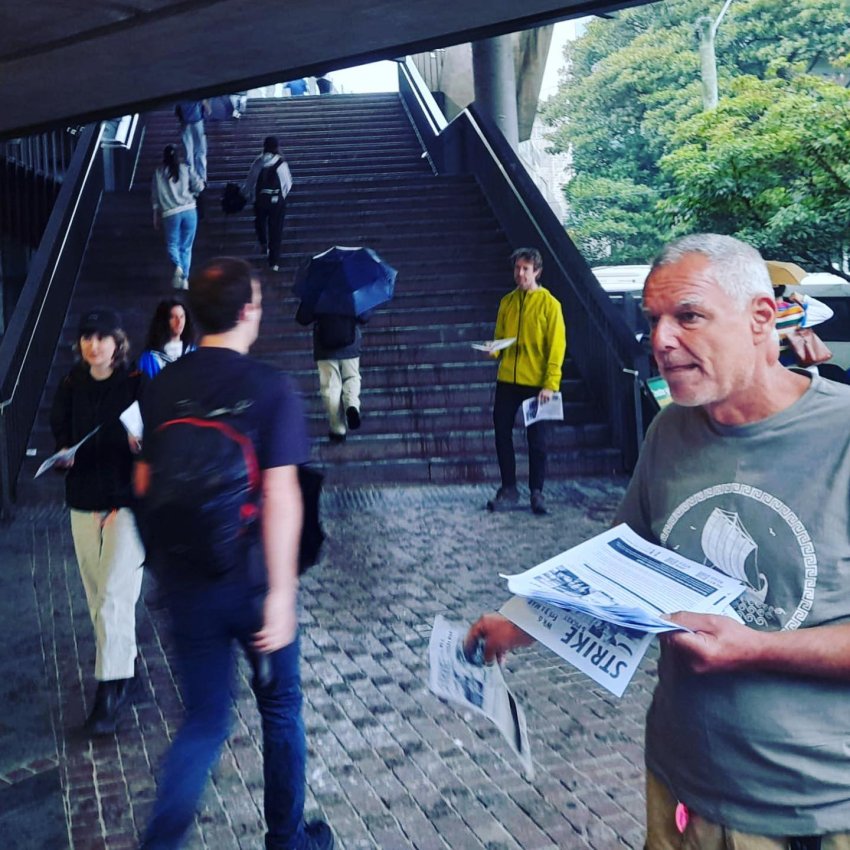
National Tertiary Education Union (NTEU) members at the University of Sydney (USyd) voted to end their industrial action after 22 months of strikes, meetings, forums, stalls, information bulletins and rallies.
A mass meeting of union members voted by 364 to 290 on April 18 against a motion to launch a three-day strike in the week starting on May 1.
The campaign has been led by a militant group at USyd, Rank and File Action (RAFA), which moved the motion for the 72-hour week of action.
Markela Panegyres, a casual academic and RAFA member of the USyd NTEU branch committee, told Green Left that the vote to end the strike action and conditionally support management’s offer was disappointing.
“Members voted up a motion that gives conditional support for a substandard deal. So, unfortunately, the vote to end strike action is a win for management.”
Panegyres said that RAFA will continue to organise on campus for better conditions. “We will keep fighting for the rights of lecturers to conduct research, for sustainable workloads and for First Nations employment parity.”
Panegyres said NTEU general secretary Damien Cahill and NSW branch industrial officer Simon Kempton had strongly urged the April 18 meeting to “wind up” the industrial action.
Cahill and others from the NTEU executive advocated the national “rapid settlement strategy”, Panegyres said, which relies on the threat of arbitration and new industrial relations laws to pressure members to capitulate.
She said the strategy prioritises settling agreements as soon as possible, using the argument that continuing to fight would weaken the branch and undermine bargaining at other universities.
Panegyres said that despite ending industrial action “for now”, NTEU members had made “some major gains” during the campaign, including five day’s sick leave for casuals, stronger commitments to First Nations cultural safety, and job security improvements for professional staff.
“We had some important wins, and highlighted some key issues: de-casualisation has been put on the map; there are 330 new ongoing positions and current casual staff have been given priority for 30% of these.
“These are big steps forward, given the extremely hostile university management,” Panegyres said.
RAFA’s work engaging union members was vital within the NTEU, Panegyres said. The NTEU branch had “gained a lot” and “we can definitely build for the future from here”.
Kevin Fine, a USyd Student Centre assistant, told Green Left that “despite the decision not to continue our strike campaign, we should emphasise the unprecedented number of strike days we undertook.
“We have significantly increased our union membership and there has been some job security gains for staff at the Student Centre."
RAFA said on April 24 that while it was disappointed in the vote, it was proud to have “taken the lead” opposing the “exploitative vision” promoted by the Provost and the Vice-Chancellor.
The USyd NTEU branch had “made history”, RAFA said, with nine days of industrial action, the 14% growth in membership and “unprecedented participation in the democratic life of the branch”.
The 290 members who voted in favour of the three-day strike “showed there is a substantial minority willing to fight”.
The union campaign forced management to revise its pay offer upwards, for the first time in any recent bargaining campaign, RAFA said.
It also forced a commitment to sick pay for casuals — a first in any university — as well as significant new leave provisions.
It also secured a significant extension of job security provisions and flexible work rights for professional staff.
RAFA said important steps to fight against casualisation included a university commitment to ensure that casual employment only made up 20% of the academic workforce.
[RAFA is holding an online forum “Building a fighting union: Lessons from USyd” on May 5 at 12pm.]